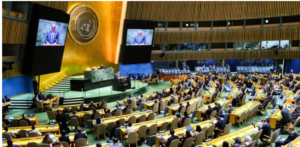The resolution passed by the UN assembly has authorized new rights for Palestine and has reignited its pursuit of UN membership
 Dennis Francis, President of the United Nations General Assembly, speaks during a special session regarding a vote on Palestinian bid for full membership to the U.N., at U.N. headquarters in New York City on May (Credit : newsweek.com)
Dennis Francis, President of the United Nations General Assembly, speaks during a special session regarding a vote on Palestinian bid for full membership to the U.N., at U.N. headquarters in New York City on May (Credit : newsweek.com)
The resolution to provide new “rights and privileges” to a Palestinian state and urge the Security Council to reconsider their admission as the 194th member of the U.N. was passed by an overwhelming majority vote in the U.N. General Assembly.The resolution, sponsored by Arab and Palestinian entities, was approved by a significant margin of 143-9, with 25 abstentions. However, it is important to note that this vote does not guarantee membership for the Palestinian state.
The global support for Palestine’s full membership in the United Nations was evident in the vote, with many nations expressing concern over the situation in Gaza and fears of a potential Israeli offensive in Rafah. While the resolution does provide Palestine with some additional rights and privileges, it maintains its status as a non-member observer state, preventing it from voting in the General Assembly or its conferences.
Out of the total number of countries, 143 supported the resolution, while nine voted against it and 25 abstained from voting. The nine countries that voted against the resolution are Argentina, Czech Republic, Hungary, Israel, Micronesia, United States, Papa New Guinea, Nauru, and Palau. On the other hand, the 25 countries that abstained from voting include Albania, Austria, Bulgaria, Canada, Croatia, Fiji, Finland, Georgia, Germany, Italy, Latvia, Lithuania, Malawi, Marshall Islands, Monaco, Netherlands, North Macedonia, Paraguay, Republic of Moldova, Romania, Sweden, Switzerland, Ukraine, United Kingdom, and Vanuatu.
The Palestinian Ambassador, Riyad Mansour, called upon member states to cast their votes in favor of the Palestinian existence, emphasizing that it is not intended to be against any particular state. He stressed the significance of a positive vote, highlighting the importance of recognizing the Palestinian state.
In contrast, the U.N. delegate of Israel, Gilad Erdan, took a different approach by tearing apart a copy of the U.N. Charter during his speech. He argued that the inclusion of a Palestinian state would violate the principles outlined in the charter, expressing his strong opposition to the proposal.
As per U.N. procedure, the Security Council is responsible for recommending a member to the General Assembly for final approval. This recommendation requires a two-thirds majority vote. Unlike the Security Council, the General Assembly members do not possess veto power. Given that more than 140 U.N. member states acknowledge the existence of a Palestinian state, encompassing the West Bank and the Gaza Strip, it was widely anticipated that the vote would pass with a significant majority.
The United States has made it clear that it will continue to block Palestinian membership and statehood until key issues are resolved through direct negotiations with Israel. These issues include security, boundaries, and the future of Jerusalem. The U.S. supports Palestinian statehood but emphasizes that it must be achieved through negotiations that ensure Israel’s security and future as a democratic Jewish state, allowing Palestinians to live peacefully in their own state.
Palestinian ambassadors have been advocating for full U.N. membership for a long time, and the recent conflict in Gaza has renewed the urgency for this. Currently, Palestine is recognized as a U.N. non-member observer state since 2012. However, the U.N. Charter states that membership is open to “all peace-loving States that accept the obligations…and are able to carry out these obligations.” The United States, as one of the five permanent members of the Security Council, vetoed a resolution in April that aimed to grant Palestine’s membership, despite majority support from other countries. This veto power allows the U.S. to block resolutions.
Ambassador Robert Wood, in response to the U.S.’s veto, raised concerns about whether Palestine meets the criteria to be considered a state and eligible for U.N. membership. He emphasized that the U.S. believes direct negotiations between Israel and the Palestinian Authority are the most effective path towards Palestinian statehood. The U.S. maintains this position and sees it as the best way to ensure Palestinian full membership in the U.N. The Associated Press reported that Ambassador Wood reiterated this stance before the vote, highlighting the importance of negotiations with Israel.
– Source : AP & newsweek.com
